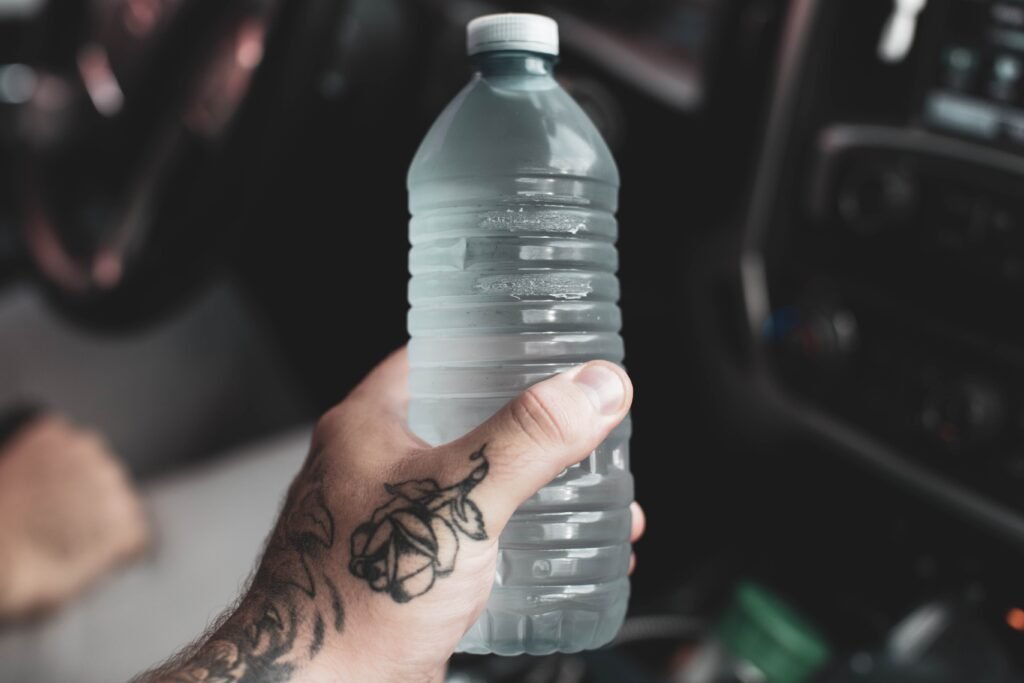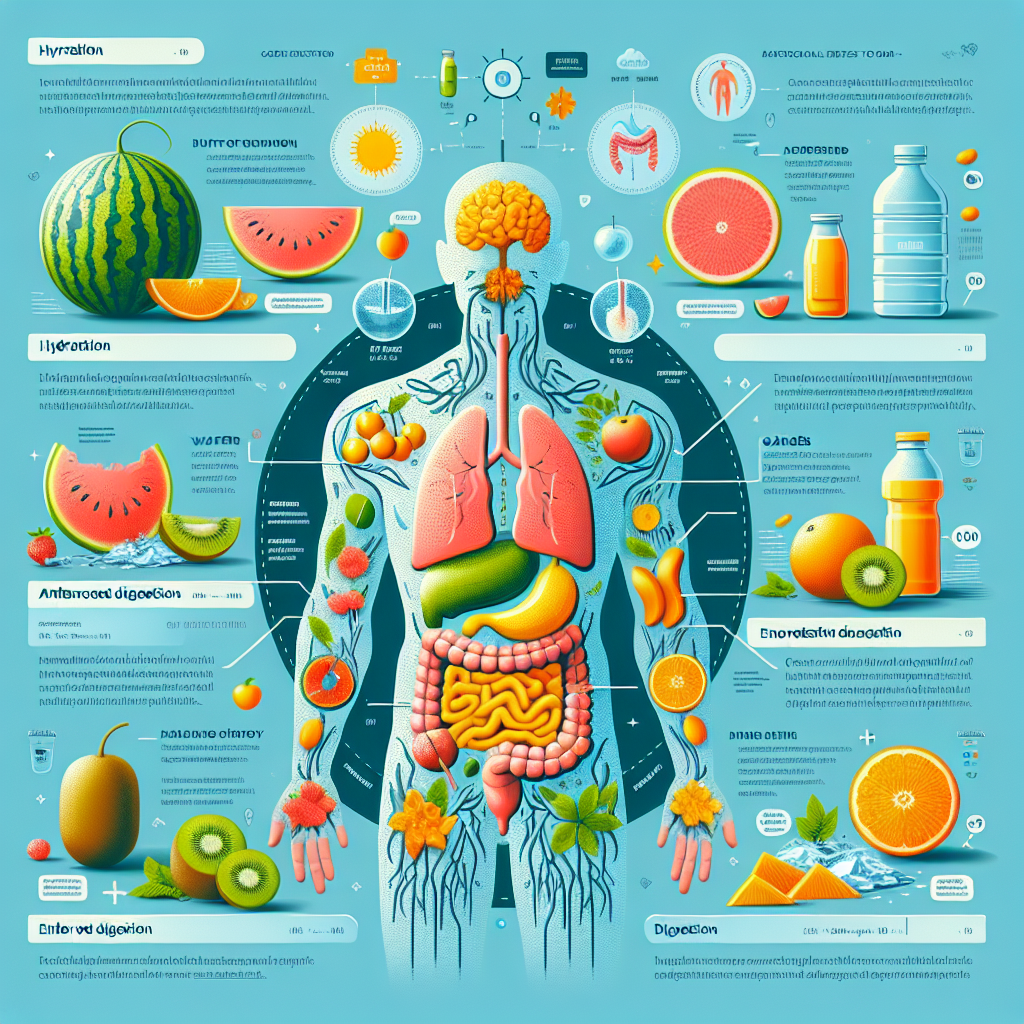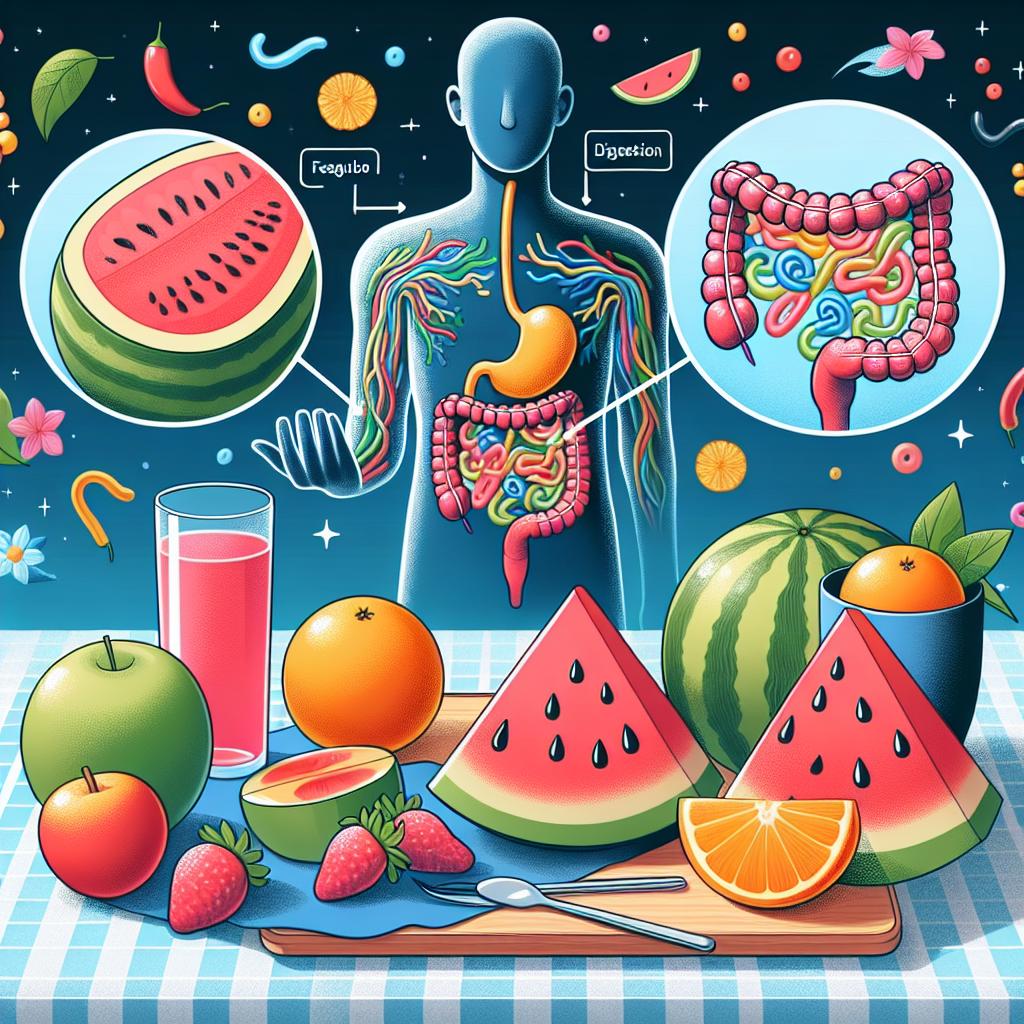Do you want to know a delicious, refreshing way to improve your digestion? Look no further than the power of hydration from fruits! In this article, we will explore how the natural water content in fruits plays a vital role in supporting a healthy digestive system. From juicy Watermelons to succulent oranges, you will discover how these hydrating fruits can keep your digestive tract happy and functioning smoothly. So grab a fruity treat and get ready to dive into the wonderful world of hydration and digestion.

Hydration and Digestion
Importance of Hydration
Hydration plays a crucial role in maintaining overall health and well-being, especially when it comes to digestion. Staying hydrated is essential for the proper functioning of our digestive system as it helps to break down food, absorb nutrients, and eliminate waste. When you are dehydrated, your digestive system can become sluggish, leading to issues such as constipation, indigestion, and even acid reflux.
Water and Digestion
Water is a fundamental component of digestion. It helps to soften and break down food, allowing it to pass smoothly through the digestive tract. Without adequate water intake, the process of digestion can become compromised. Water also assists in the production of digestive juices, such as saliva, gastric acid, and bile, which aid in the breakdown of food particles.
Role of Hydration in Digestive Enzymes
Proper hydration is essential for the optimal production and function of digestive enzymes. These enzymes are responsible for breaking down carbohydrates, proteins, and fats into smaller molecules that can be easily absorbed by the body. When you are well-hydrated, your body can produce and release an adequate amount of digestive enzymes, ensuring efficient digestion and nutrient absorption.
Hydration and Nutrient Absorption
Hydration is closely linked to nutrient absorption. Without sufficient water intake, the absorption of nutrients from the digested food can be hindered. Water helps to transport these nutrients across the intestinal walls and into the bloodstream, where they can be utilized by the body. Therefore, maintaining proper hydration levels is vital for maximizing the benefits of the nutrients we consume.
The Key Benefits of Fruits in Hydration
Water Content in Fruits
Fruits are not only delicious and nutritious, but they also contain a high water content. This makes them an excellent choice for staying hydrated. Many fruits, such as watermelon, oranges, and berries, have a water content of over 80%. Incorporating hydrating fruits into your diet can help replenish your body’s water levels and support optimal hydration.
Natural Electrolytes in Fruits
In addition to their water content, fruits also contain natural electrolytes, which play a crucial role in maintaining fluid balance in the body. Electrolytes, such as potassium and magnesium, help regulate hydration levels and ensure proper functioning of various bodily processes. Fruits like bananas and oranges are particularly rich in electrolytes, making them an ideal choice for replenishing electrolyte stores.
Fiber in Fruits
Fiber is another important component of fruits that contributes to hydration. While fiber itself does not provide hydration, it helps to regulate water balance in the body. Soluble fiber absorbs water and forms a gel-like substance in the digestive tract, promoting proper hydration and preventing dehydration. Fruits like apples, pears, and berries are excellent sources of dietary fiber.
Antioxidants in Fruits
Fruits are known for their abundance of antioxidants, which offer various health benefits, including supporting hydration. Antioxidants help combat oxidative stress, which can contribute to dehydration. By reducing cellular damage and promoting overall health, antioxidants found in fruits, such as berries and citrus fruits, can indirectly support optimal hydration.
Best Fruits for Hydration and Digestion
Watermelon
Watermelon is an excellent fruit for both hydration and digestion. With a water content of around 92%, it is incredibly refreshing and hydrating. It is also rich in electrolytes like potassium, which aids in maintaining proper fluid balance. Watermelon is easy to digest and contains fiber that supports healthy digestion.
Cucumber
Cucumbers are not only incredibly hydrating, with a water content of approximately 96%, but they are also low in calories and high in fiber. This makes them an ideal choice for those looking to stay hydrated while managing their weight. Cucumbers also contain enzymes that support digestion and can help alleviate digestive issues such as bloating and indigestion.
Oranges
Oranges are not only packed with immune-boosting vitamin C but are also an excellent choice for hydration and digestion. With a water content of around 87%, oranges are hydrating and refreshing. They are also high in soluble fiber, which aids in regulating bowel movements and supporting healthy digestion.
Pineapple
Pineapple is a tropical fruit that offers both a sweet taste and numerous health benefits. With a water content of approximately 86%, pineapple provides hydration while also delivering essential vitamins and minerals. It contains bromelain, an enzyme that aids in digestion and helps break down proteins, making it easier for the body to absorb nutrients.
Berries
Berries, such as strawberries, blueberries, and raspberries, are not only tasty but also hydrating. With a water content of around 85%, they are a great choice for maintaining hydration levels. Berries are also packed with fiber, antioxidants, and vitamins, all of which support healthy digestion and overall well-being.
Hydration Timing and Fruit Consumption
Pre-meal Hydration
Consuming hydrating fruits before a meal can be beneficial for digestion. Eating water-rich fruits, such as watermelon or oranges, before a meal can help prime your digestive system by providing hydration and promoting proper digestion. It also helps create a feeling of fullness, leading to better portion control during the main meal.
During-meal Hydration
While it is generally recommended to avoid consuming large amounts of liquids during meals as it can dilute stomach acid and impair digestion, small sips of water or enjoying fruit slices as part of your meal can provide additional hydration without significantly affecting digestion. Water-rich fruits, like cucumber or pineapple, can be a refreshing and hydrating addition to your meal.
Post-meal Hydration
After a meal, it is essential to replenish your hydration levels. Enjoying hydrating fruits, such as berries or watermelon, as a post-meal snack can help satisfy your sweet cravings while also providing necessary hydration. It is important to note that drinking water is also crucial post-meal to aid in digestion and nutrient absorption.

Hydration Alternatives: Juice vs. Whole Fruits
Juice vs. Whole Fruit Hydration
When it comes to hydration, choosing whole fruits over fruit juices is generally recommended. While fruit juices may still provide hydration due to their water content, whole fruits offer the additional benefits of fiber and antioxidants. The fiber in whole fruits helps regulate digestion and prevents blood sugar spikes, making them a healthier choice overall.
Fruit Juice and Fiber
One of the main drawbacks of fruit juice is the lack of fiber. When fruits are juiced, the fiber is often removed, leaving mainly the liquid and the natural sugars. Fiber not only aids in digestion but also slows down the absorption of sugars, preventing sudden blood sugar spikes. Therefore, Consuming whole fruits instead of fruit juices is a better option for maintaining optimal hydration and digestive health.
Added Sugars in Fruit Juice
Another factor to consider when choosing between fruit juice and whole fruits is the presence of added sugars in some fruit juices. Many commercially available fruit juices contain added sugars, which can contribute to dehydration and other health issues. It is important to read the labels and choose unsweetened or freshly squeezed fruit juices to avoid unnecessary sugar intake.
Hydration from Dehydrated Fruits
Benefits of Dehydrated Fruits
Dehydrated fruits can be a convenient and tasty option for hydration, especially when fresh fruits are not readily available. Dehydrated fruits retain a significant amount of their nutrients and can provide a concentrated source of hydration. They are lightweight and portable, making them an excellent option for on-the-go hydration.
Considerations for Dehydrated Fruit Intake
While dehydrated fruits can contribute to hydration, it is important to consume them in moderation. They tend to be higher in sugar and calories compared to fresh fruits due to the removal of water content. It is crucial to read labels and choose dried fruits with no added sugars or preservatives. It is also essential to drink sufficient water alongside dehydrated fruits to ensure proper hydration.
Hydrating with Dehydrated Fruits
To stay hydrated with dehydrated fruits, it is recommended to rehydrate them before consumption. Soaking dried fruits in water for a short period can help restore some of their water content, making them more hydrating. However, it is important to note that rehydrated fruits may not provide the same level of hydration as fresh fruits due to the loss of certain nutrients during the drying process.

Balancing Fruit Hydration with Other Fluids
Water as the Primary Hydrating Fluid
While fruits can contribute to hydration, it is essential to prioritize water intake as the primary hydrating fluid. Water is vital for maintaining overall hydration levels and supporting the proper functioning of the body. Drinking an adequate amount of water, alongside hydrating fruits, ensures optimal hydration and supports digestive health.
Beverages to Complement Fruit Hydration
In addition to water, there are other beverages that can complement fruit hydration. Herbal teas, such as chamomile or peppermint tea, can provide additional hydration while also promoting digestion. Coconut water is another hydrating option that offers natural electrolytes and is rich in potassium. However, it is important to choose beverages that are low in added sugars and artificial additives.
Monitoring Hydration Levels
Monitoring your hydration levels is crucial in ensuring you are adequately hydrated. Pay attention to signs of dehydration, such as dark urine, dry mouth, or fatigue. Aim to drink water regularly throughout the day and incorporate hydrating fruits into your meals and snacks. If you engage in rigorous physical activity or spend time in hot weather, it may be necessary to increase your fluid intake.
Hydration for Optimal Digestion
Effects of Dehydration on Digestive System
Dehydration can have a significant impact on the digestive system. When the body lacks sufficient water, digestion can slow down, leading to issues such as constipation, bloating, and indigestion. Insufficient hydration can also affect the production of digestive enzymes and impair nutrient absorption. Therefore, maintaining proper hydration is important for optimal digestion.
Improving Digestion through Hydration
Hydration plays a key role in improving digestion. By staying well-hydrated, you can help ensure that food is properly broken down and digested. Water assists in the smooth movement of food through the digestive tract and supports the release of digestive enzymes. Optimal hydration levels also help prevent constipation and promote regular bowel movements.
Enhancing Nutrient Absorption
Hydration is closely linked to nutrient absorption. When you are dehydrated, the absorption of nutrients from the digested food can be compromised. By staying well-hydrated, you can enhance the absorption of essential vitamins, minerals, and other nutrients. This, in turn, supports overall health and helps maintain optimal digestion.

The Role of Hydration in Gut Health
Water and the Gut Microbiota
Hydration plays a vital role in maintaining a healthy gut microbiota. The gut microbiota consists of trillions of microorganisms that aid in digestion and support overall gut health. Proper hydration helps create an optimal environment in the gut, allowing these beneficial microorganisms to thrive. It also helps prevent issues such as constipation and supports regular bowel movements.
Fruit Fiber and Gut Health
Fruits are rich in fiber, which is beneficial for gut health. Fiber acts as a prebiotic, providing nourishment for the beneficial bacteria in the gut. By consuming hydrating fruits that are high in fiber, such as berries and apples, you can promote a healthy gut microbiota and support optimal digestion.
Hydration and Bowel Movements
Adequate hydration is essential for regular bowel movements. When you are dehydrated, the colon absorbs more water from the stools, leading to harder and more difficult-to-pass stools. This can result in constipation and other digestive issues. By staying well-hydrated, you can promote soft and regular bowel movements, supporting overall gut health.
Conclusion
Hydration is a crucial aspect of maintaining optimal digestion and overall health. By incorporating hydrating fruits into your diet and staying well-hydrated, you can support digestion, enhance nutrient absorption, and promote a healthy gut. Remember to prioritize water as the primary hydrating fluid and choose whole fruits over fruit juices whenever possible. By making hydration a priority, you can enjoy the many benefits of fruits in digestion and maintain a happy and healthy digestive system.


